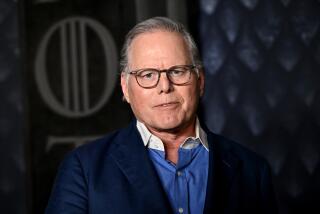Gal Gadot’s reported ultimatum to Warner Bros. over Brett Ratner’s involvement in ‘Wonder Woman 2’ is likely moot
Warner Bros. finds itself in an awkward situation with Gal Gadot, the star of its most important movie of the year, “Justice League,” which debuts Friday.
At the center of the issue is the studio’s relationship with embattled filmmaker Brett Ratner, who has been accused by several women of a range of acts of sexual misconduct.
A widely circulated report published by the New York Post on Saturday said that Gadot, who starred in the summer blockbuster “Wonder Woman,” would not appear in the planned 2019 sequel if Ratner’s financing company, RatPac-Dune Entertainment, were to be involved.
The company, which has a co-financing or slate deal with Warner Bros. that began in 2013 and covers up to 75 films, helped pay for “Wonder Woman,” along with most other movies from the studio in recent years.
But any alleged ultimatum by Gadot would appear to be a moot point.
RatPac-Dune’s financing agreement with Warner Bros. expires in spring 2018, and as a result, the existing deal is not expected to include funding part of the “Wonder Woman” sequel, according to people familiar with the matter who were not authorized to comment publicly. Warner Bros. announced Monday that the follow-up film would be released Nov. 1, 2019.
Melissa Raubvogel, Gadot’s publicist, did not respond to repeated requests for comment. A spokesman for Warner Bros. called the Post story “false” and declined to comment further.
The last film to be covered by the existing RatPac-Dune deal is likely to be “Rampage,” an action-adventure movie that stars Dwayne Johnson and comes out April 20, according to a person with knowledge of the matter. Typically, slate financing deals cover films that are released in theaters within the effective dates of the arrangement.
After the Los Angeles Times published a Nov. 1 story about Ratner that detailed allegations by actresses including Olivia Munn, Natasha Henstridge and Jaime Ray Newman, Warner Bros. cut ties with the filmmaker. The studio chose not to renew its production deal with Ratner’s other company, RatPac Entertainment, and he will no longer keep an office on the studio’s Burbank lot.
Ratner, through his attorney, Martin Singer, has “categorically” disputed the women’s accounts. But the 48-year-old filmmaker, best known for the “Rush Hour” franchise, said in a statement that he was “choosing to personally step away from all Warner Bros.-related activities.”
“I don’t want to have any possible negative impact to the studio until these personal issues are resolved,” he said.
“Wonder Woman,” which was released in June and grossed more than $820 million worldwide, gave a big boost to Warner Bros. at a time when it was getting pilloried by critics and fans alike for its handling of a series of movies involving DC Comics characters. Films including “Batman v Superman: Dawn of Justice” and “Suicide Squad” underwhelmed critics, though both grossed more than $700 million worldwide.
Gadot reprises her Wonder Woman role in “Justice League,” which pulls together characters Batman, Aquaman and others for a superhero romp that has been compared to Walt Disney Co.’s successful “Avengers” franchise.
The Post’s story, which appeared in the Page Six column and cited unnamed sources, said Gadot is “tough and stands by her principles.”
Gadot already has extricated herself from a Ratner-involved event in recent weeks. She was slated to give a Jewish National Fund award to Ratner in late October, but the actress’ publicist announced she would not appear at the event because of a scheduling conflict.
Instead, “Wonder Woman” director Patty Jenkins, who has known Ratner for years, presented him the award.
It is unclear what will become of RatPac-Dune’s relationship with Warner Bros. beyond next spring. The company is currently led by Len Blavatnik, a billionaire whose Access Entertainment bought out former RatPac-Dune principal James Packer, an Australian casino tycoon, earlier this year. Access declined to comment.
RatPac-Dune also previously included now-Treasury Secretary Steven T. Mnuchin as a principal, but he sold his stake as part of his move into government work this year.
Times staff writer Amy Kaufman contributed to this report.
UPDATES:
3:55 p.m.: This article was updated with additional details.
This article was originally published at 12:50 p.m.
More to Read
Inside the business of entertainment
The Wide Shot brings you news, analysis and insights on everything from streaming wars to production — and what it all means for the future.
You may occasionally receive promotional content from the Los Angeles Times.











